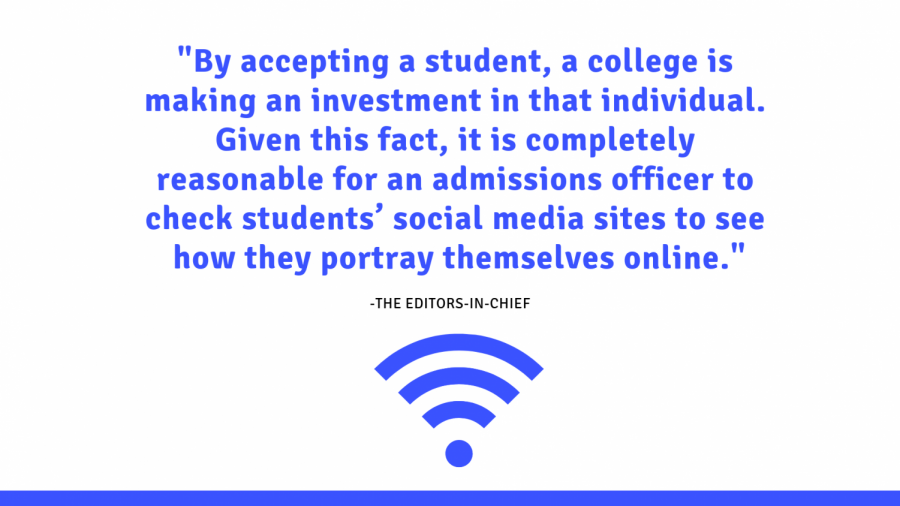Editor-in-Chief Editorial: The Application Issue
The Editors-in-Chief discuss the importance of considering students’ social media in the college admissions process.
February 12, 2019
This article was originally published in the Jan. 30 print edition of The Hawk Talk.
Over the years, the college admissions process has changed in a variety of ways. More institutions have shifted to the holistic review philosophy, in which factors beyond just standardized test scores and grades are considered. Many colleges require students to submit essays and an extracurricular activities list in an attempt to obtain a clearer image of who each student is beyond their statistics.
However, by clicking one tab over from a student’s application, any admissions officer has access to the world of social media, where they may learn more about a student’s character than they will from any edited essay.
Some students in the college application process feel that admissions officers reviewing social media is a violation of privacy or is an unnecessary practice, but we, the four Editors-in-Chief, disagree. By accepting a student, a college is making an investment in that individual. Given this fact, it is completely reasonable for an admissions officer to check students’ social media sites to see how they portray themselves online.
A 2016 telephone survey by Kaplan Test Prep revealed that 35 percent of college admissions officers from 365 schools check students’ social media sites. This survey also found that the social media insight resulted in a positive impact on the view of applicants for 47 percent of officers and a negative impact for 42 percent of officers— a statistic we were very surprised by. If a student provides information about one of their areas of involvement not disclosed in their application, this may be a sign for an admissions office that the student will be a better fit for the school than they originally realized.
Despite this promising information, 42 percent of officers still reported that their views of applicants were negatively impacted by social media. This may seem problematic or disappointing, but in actuality, this is a positive. College admissions officers have difficult jobs. Deciding between applicants can come down to very specific information, and in certain situations can result in unfair outcomes. With access to the social media sphere, officers may gain personal information that can serve as a deciding factor between two similar applicants.
If a student chooses to display illegal activity or vulgar language on their social media page, this may be a sign for an admissions office that the student will not be a good fit for the school. It is up to each individual person how they portray themselves in the public online world, and as college applicants, students must understand that the information they share may have positive or negative consequences in their admissions process.
Not only does being mindful of social media presence help college applicants during the process, but it also prepares them for the future. According to a 2018 CareerBuilder survey, 70 percent of employers screen candidates’ social media prior to hiring them. High school students can benefit from considering their digital footprint as a component of their college application, before it is essentially a part of their job application as well.
The student body at any given university is a reflection of the university itself. While the large majority of admissions officers do not review applicants’ social media sites, they are completely justified in doing so, given how telling these platforms can be.



